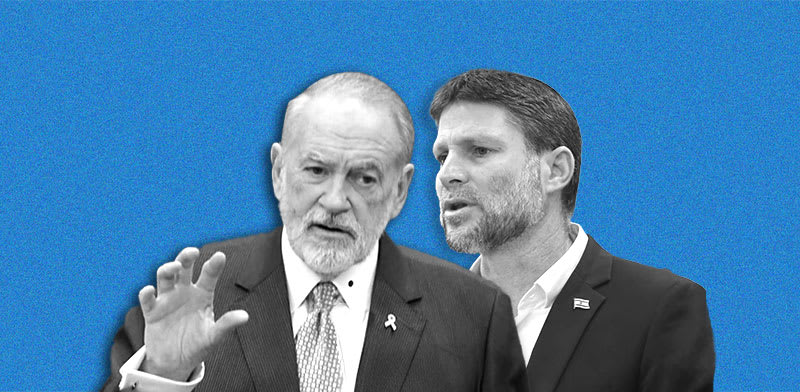At the end of a tough few days on the diplomatic front, in which Israel had to deal with the suspension of free trade agreement talks by the UK and the (denied) report that President Donald Trump had threatened to abandon Israel, if it did not end the war, Minister of Finance Minister Bezalel Smotrich and the country’s economic leadership attended a reception for the US Ambassador to Israel, Mike Huckabee on Wednesday evening. During the event in Jerusalem, the new ambassador, who has consistently held pro-Israeli positions for decades, delivered warm and embracing remarks about Israel that went beyond standard diplomatic compliments.
However, “Globes” has learned that in closed meetings, Huckabee conveyed messages from Washington to the government about a number of economic issues that are bothering the US administration and pressed to consider addressing them. This is in addition to the trade barriers that the administration has already mentioned as part of Trump’s tariff plan.
Measures arousing opposition in the US
Last week Smotrich and Ministry of Finance chief economist Shmuel Abramzon met with Huckabee and his professional team to discuss the economic issues on the agenda. The Americans expressed dissatisfaction over the Ministry of Finance’s opinion that US energy giant Chevron must be removed from either the Tamar of the Leviathan gas field and could not continue operating both.
The Ministry of Finance position, which was recently supported by the Ministry of Environmental Protection stems from the demand to increase competition in Israel’s gas market and reduce dependency on monopolies. Those advocating the ousting of Chevron argue that the company holds too dominant a share of the local gas market, which could lead to high costs for consumers and expose the economy to risks.
The Ministry of Energy and Infrastructure, on the other hand, resolutely opposes the move, claiming that forcing out Chevron would paint Israel in a negative light in the eyes of international investors and make it difficult to develop the gas economy and find new fields. There is also a dispute between the ministries on the extent of reserves that should be reserved for domestic use. The Ministry of Energy proposes 440 BCM, while the Ministry of Finance and Ministry of Environmental Protection want a larger amount that would last for 25 years.
Another matter raised by Huckabee concerned Minister of Communications Shlomo Kari’s broadcasting reform, which was approved by the Ministerial Committee for Legislation despite the opposition of the Attorney General. US concern focuses mainly on the clause that extends the obligation to invest in Israeli original productions to international streaming services such as Netflix, Amazon Prime and Disney Plus.
RELATED ARTICLES
According to the reform, foreign streaming giants would be required to invest part of their revenue in Israel in local productions. While Israeli TV channels are required to invest a percentage of their revenue in original productions, US streaming services have so far enjoyed an exemption. The new requirement is seen by the Americans as imposing an additional financial burden on US companies and harming fair competition.
According to sources at the meeting, Huckabee repeated several times that “fair play” must be ensured for US companies operating in Israel, and that “there is a level playing field.” He explained that the US has no intention of harming Israeli companies, but made it clear that legislation or steps that would harm the US economy were unacceptable. Smotrich agreed and told the ambassador that a policy of fair play would be right for both countries. However, the parties did not form any decisions on the requests made by Huckabee.
Also on the agenda: The issue of tariffs on Israel
On the issue of tariffs, Huckabee said he was interested in helping Israel and would try to expedite the talks. However, Huckabee himself is not directly involved in the matter. Following last week’s meeting, Smotrich and Huckabee met again last Sunday, for a political discussion at the Prime Minister’s Office.
How significant would the damage to Israel be if it were included in Trump’s tariff plan? This would be a much more major impact on the Israeli economy than the local elimination of tariffs on US goods. In 2024, Israeli exports of goods to the US amounted to $17.3 billion, while exports of services, mainly in the tech industry, were estimated at $16.7 billion. A 20% tariff on goods alone, services are generally not subject to tariffs, could amount to billions of dollars annually.
“US benefits from the strength of the Israeli economy”
At the event in Jerusalem, Huckabee insisted that big US needs little Israel – and not just the other way around. After reviewing the country’s economic and technological achievements, Huckabee said: “I hope America will always understand that it’s not just us helping you, as Americans think, but that you’re helping us. This is a partnership. You’re not only recipients. We’re on the receiving end too. The US benefits from the strength of the Israeli economy.”
The words were designed for Israeli ears. He was addressing the top officials of the Ministry of Finance and the Bank of Israel, senior bank and insurance company executives and investors, Huckabee did not explicitly address the elephant in the room – what the fate of Israel will be in the tariff plan. However, Huckabee’s flattering words about Israel can also be interpreted another way. Many in America believe that the relationship between the countries is one-sided and that Israel is the sole beneficiary, especially on the economic level.
The subtext is that Israel must show that it is not only being helped but also helping the Americans, and the way to do this is through the new demands regarding Chevron and the streaming companies.
Published by Globes, Israel business news – en.globes.co.il – on May 22, 2025.
© Copyright of Globes Publisher Itonut (1983) Ltd., 2025.








